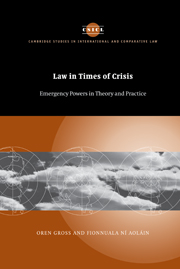Book contents
- Frontmatter
- Contents
- Acknowledgments
- Table of cases
- Table of treaties
- Table of legislation
- Table of international materials
- Introduction
- Part I
- Part II
- 5 International human rights and emergencies
- 6 Emergencies and humanitarian law
- 7 Terrorism, emergencies, and international responses to contemporary threats
- Bibliography
- Index
- CAMBRIDGE STUDIES IN INTERNATIONAL AND COMPARATIVE LAW
6 - Emergencies and humanitarian law
Published online by Cambridge University Press: 03 September 2009
- Frontmatter
- Contents
- Acknowledgments
- Table of cases
- Table of treaties
- Table of legislation
- Table of international materials
- Introduction
- Part I
- Part II
- 5 International human rights and emergencies
- 6 Emergencies and humanitarian law
- 7 Terrorism, emergencies, and international responses to contemporary threats
- Bibliography
- Index
- CAMBRIDGE STUDIES IN INTERNATIONAL AND COMPARATIVE LAW
Summary
The compacted relationship between war and emergency is under-explored theoretically. This chapter examines that relationship in the context of classic inter-state war and also explores it with respect to nebulous and underdefined situations of internal armed conflict. We set out three principles that shape our thinking in this context, and then move to assess some of the quandaries which arise when situations of war or conflict intersect with emergencies. First, international humanitarian law is prima facie an accommodation model. Second, its genesis was located in the understanding that war required legal limits, understood and internalized by both combatants and states. Finally, war fulfills the classic definition of an “emergency” as set out by international human rights law norms. This is specifically recognized by the language of some of the derogation provisions that allow for derogation “in times of war or other emergency.”
In identifying “war” and unpacking the effects of its practices in the legal sphere a number of observations can be made. First, that the experience of war is an acute actualization of the breaking down of dichotomies and clear-cut distinctions between the normal and the extreme. Second, we identify the fallacy of basic assumptions underlying the conceptualization of “war” and “emergency,” and the attempts to separate them as unique and distinct phenomena. In particular, as we have done throughout this book, we wish to test the perceived wisdom that normalcy is the general rule while emergency constitutes the exception to that rule.
- Type
- Chapter
- Information
- Law in Times of CrisisEmergency Powers in Theory and Practice, pp. 326 - 364Publisher: Cambridge University PressPrint publication year: 2006
- 2
- Cited by

